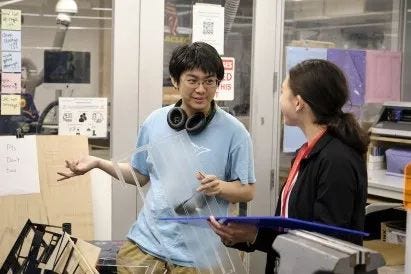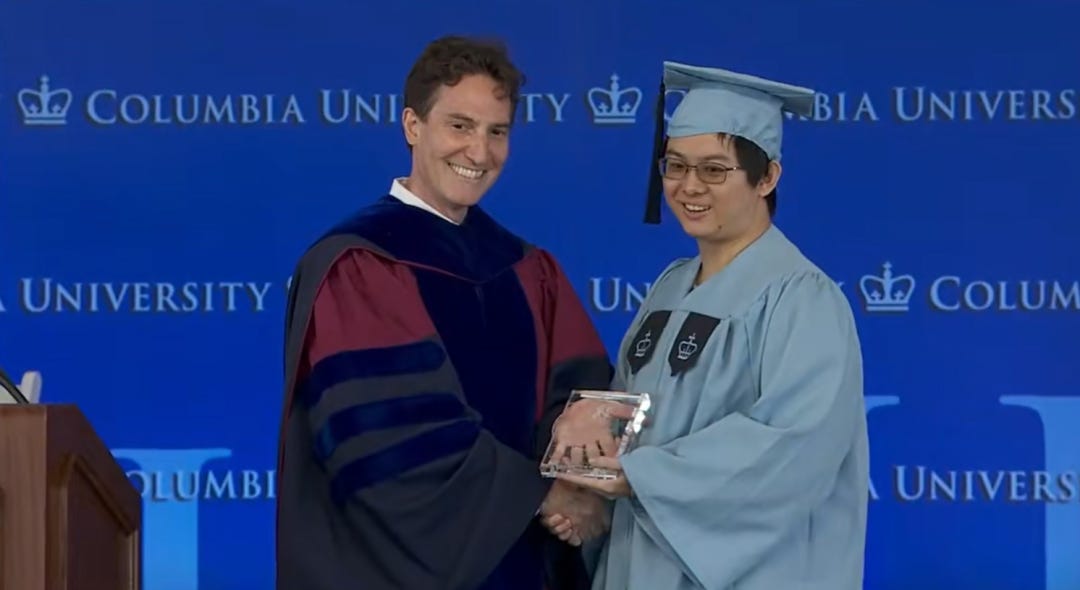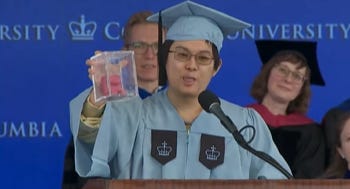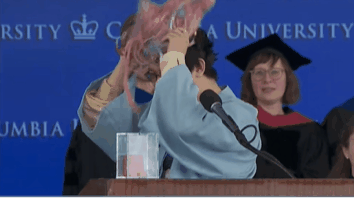How a Chinese-American Engineering Valedictorian’s Speech at Columbia Moved the Entire Campus
On May 19, Columbia University’s School of Engineering and Applied Science celebrated its annual Class Day. In a moment that will long be remembered, Valedictorian Andrew Yang (BS ’25) strode to the podium in full academic regalia, having just received both the Applied Physics Faculty Illig Award and his Valedictorian certificate. His address—equal parts laughter and reflection—resonated deeply with faculty, family, and fellow students. Andrew eschewed grand theatrical gestures in favor of genuine anecdotes: shining lasers on nanoscale mirrors, impromptu city explorations, and even a cameo in a video game costume. Through it all, he wove together technical insight and personal vulnerability, reminding everyone that “engineering for humanity” is as much about community as it is about equations.
About Andrew Yang
Andrew Yang graduated in 2025 with dual Bachelor’s degrees in Applied Physics and Applied Mathematics, earning Valedictorian honors and the Illig Award. His research uniquely combines machine learning and materials science: alongside Assistant Professor Xuenan Li, he designed LSTM models to identify periodic singular structures, and with Professor Simon Billinge, he developed high-throughput diffraction algorithms to detect material changes—tools he has field-tested at beamline facilities across three continents.
A passionate educator, Andrew became the first Columbia undergraduate invited to speak at the Bruker-AXS/MIT Symposium. He co-taught CAD to local high-school students through the SHAPE program and served as a teaching assistant in courses on dynamical systems and machine-learning applications under Professors Li, Nakul Verma, and Billinge. This fall, he will begin his PhD at Caltech, where he plans to apply neutron diffraction and advanced machine-learning models of interatomic potentials to further unravel complex material behaviors.
Image from: Columbia University
Key Highlights from His Address
Authenticity Over Showmanship
Andrew opened with self-deprecating humor—“They chose the dork with the Among Us keychain”—and spoke candidly about his dual role as researcher and teacher.Waves as Metaphor
He compared the microscopic ripples seen in laser-illuminated materials to the “ripples of interaction” on campus: orientation-week hellos, tearful goodbyes, and spontaneous adventures.Risk and Reward
From near-misses with beaver fever to debate with a former sociology professor on a Los Angeles bus, Andrew championed stepping into uncertainty as the catalyst for growth.Community Commitment
Despite Columbia’s rigorous labs and lucrative internships, he emphasized that what truly unites engineers is their dedication to one another—embodied in the school’s motto, “Engineering for Humanity.”
Image from: Columbia University
Full Speech (Original English)
Thank you! Dean Morrison.
Every good ceremony places its best speeches at the beginning and the end which is why I'm speaking in the middle of our class day.
And to be honest, that’s fair. When I look at this crowd, I see students pioneering clean energy. Ridding plastic from our oceans. We have a real-life Stark lab featured recently in a Veritasium video.
Students using machine learning to explore the quantum world. And working with NASA to launch a freaking satellite to space.
Despite all of these amazing people who could be up here today. They chose the dork with the Among Us keychain—that you’ve probably never seen outside of class.
For those of you who've had me as a T.A. though, watching me yap up here probably isn’t strange. You know I love lecturing and could very well spend the next 45 minutes glazing Euclidean distance matrices.
But the best part about teaching here at Columbia is seeing how we all interact so differently with the same material. And I think this is representative of Columbia as a whole.
Now, don't fact-check me but not only does our class represent all 50 states, we represent almost half the countries.
We come from the biggest cities to the smallest towns and a fifth of us are the first in our families to even attend—let alone graduate—university.
Yet together as one class. We struggled through introductory physics, bared through the insane heat waves in our dorms, pulled all-nighters to finish our Art of Engineering projects and spent hours in Butler how to add just one more page to our Music Hum essays.
So I want to share a bit about my background and how it shaped my perspective here. Now I know we're all excited to graduate and finally be free of classes. But unfortunately, I'm going to put you through one last lecture.
My research is all about how materials look on the nano scale. So current microscopes aren't powerful enough to see the individual atom, so we have to be a little more creative and we shine lasers on them.
So it's kind of like when you shine a laser on a mirror and the direction the laser bounces tells you the angle the mirror is oriented.
But no real-world mirror is perfectly smooth so if you turn off the lights and use a strong enough laser, you can see not only a bright dot where the reflected light lands but also small fluctuations in light.
These minute ripples tell us what atoms compose our mirror and where the defects are.
The tiniest waves are the most important—waving hi in orientation week to some of your now closest friends, tearful waves goodbye to your family after convocation—who have hopefully rejoined you on this day.
Shout out to my mom, dad, my grandfather, my grandmother, and my sister Annie who’s just starting high school—no pressure, alright!
Sound waves of applause at our amazing performers and learners from waving flags to wavy tides at the free kayaking sessions downtown. We make these waves every day from the interactions and time we spend with each other.
In 1807, Joseph Fourier showed how waves can combine to form beautiful functions. Our interactions combine to form this beautiful community.
When you think back at the time you spent here, what's going to stick with you?
Well. Sure, the horrors of a machine learning midterm are probably never going to leave you.
But I'm certain it's also filled with unplanned urban explorations, watching sunsets on the Brooklyn Bridge, losing four buy-ins in five hands of Hold'em, and making an Among Us-shaped candle for white elephant.
All of these with friends by your side.
While we have some of the most rigorous courses, access to lucrative internships and the best research laboratories, what really makes us us is our commitment to each other.
After all, our slogan is not just engineering, but engineering for humanity.
And Columbia engineers—engineers—are particularly well versed in the humanities.
So I'm going to Caltech for my PhD—shout-out to Brent's lab who are hopefully on live right now.
And when I went to visit LA I got lost late at night looking for Union Station and I asked a stranger at the bus stop for directions and ended up sitting next to him on the bus.
We chatted a bit before our conversation turned to the syllogisms and the Nicomachean Ethics and he was impressed that Columbia taught us so well about Aristotle that he offered to take me out for dinner and, well, sure!
I could have ended up without my kidneys and in an ice bath it turns out he was a former sociology professor and we engaged in one of my most exciting debates about what it means to belong somewhere all because I went screw it, I'm in.
Which brings me to my final point—the importance of taking risks splashing through the ripples of uncertainty.
While this mindset has led to unpleasant situations like being detained in Japan during midterms week and googling symptoms of beaver fever after drinking water from a creek—hear me out.
I wanted to try the cold spring up at Cold Springs so I...don't do it,
but taking these risks has also allowed me to explore amazing physics across the Pacific Ocean, become the first undergraduate speaker for the Bruker / MIT Symposium, and wear a video game costume for graduation speech!
Thank you.
One more—despite all of this, sorry.
Now, more than ever, it feels difficult to take risks, especially when it feels like the whole world is watching and there's always something we can lose.
Despite this I'm confident our class is exclusively qualified to overcome any hardship.
During our end stop, our campus flooded from the rain but rather than hiding away we brought out a boat and Sea of Thieves’d our way outside of John J.
We survived a pandemic stood with our families abroad and braved events other students may never face in their lives.
We even spent a good portion of college without generative AI like. Is it crazy like we started our journey without Claude or Perplexity,
and now lolms have dominated our oh sorry... ehh...GPT says I'm out of free credits so I guess I have to close things off.
We came here maybe not knowing about what the future would hold and definitely not knowing what these four years would bring, but we made it with the invaluable support of our friends and family.
After weathering so many tides, we've made it to the crest of our college careers.
Look among us, class of 2025, we are seas and we're gonna make waves.
Clap a little longer so I can put my robe back on.
Thank you class, best class ever in the university, thank you, thank you, Ok, that's enough, alright, thank you so much sorry for the cheesy send off, but if you wanted a professional speaker you would have looked in the college.
Now I'd like to invite Reid Ellison, class of 2008 and president of the Columbia Engineering Alumni Association to the podium.







